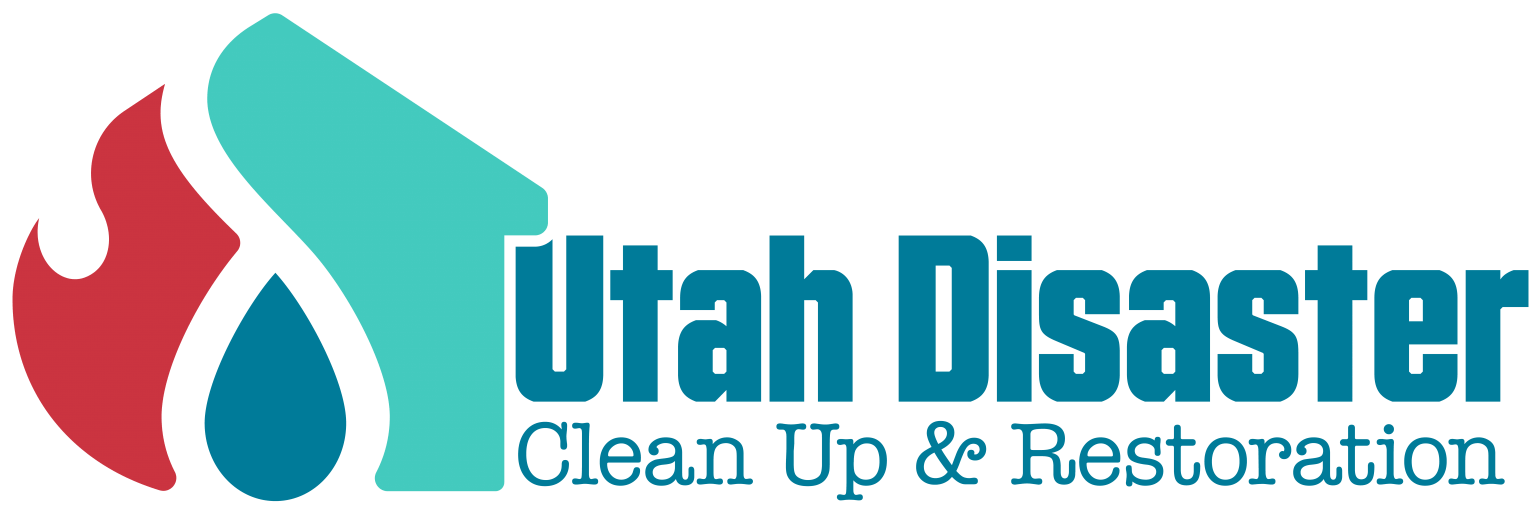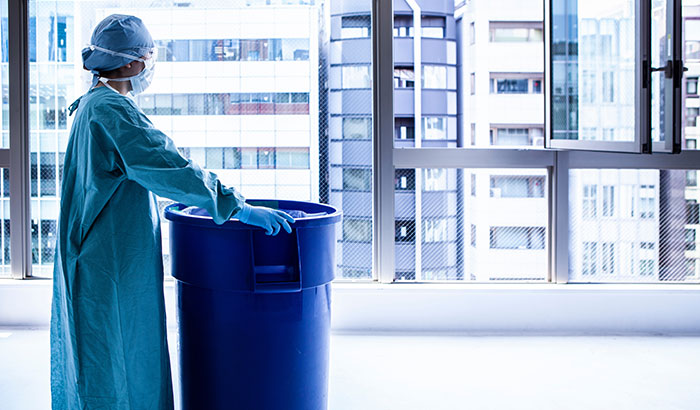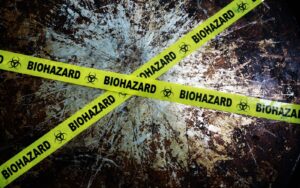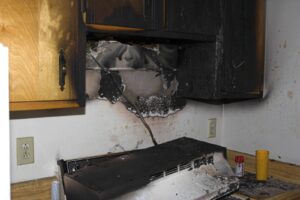If you have found yourself in a situation where biohazardous materials are part of the cleanup process, you may want to consider hiring a professional. You might consider just doing it yourself. Well…
This article will give you ten reasons to hire a professional for biohazard cleanup and ten things you should consider before hiring a professional.
But first, let’s look at what is considered a biohazard:
Biohazard materials are materials that contain biological agents with the potential to cause harm to living organisms, including humans. These materials can include infectious agents like bacteria, viruses, fungi, parasites, toxins, and other hazardous biological materials.
Biohazard materials can be found in many settings, including medical and research laboratories, hospitals, veterinary clinics, and even in the natural environment. They can take many forms, such as bodily fluids, tissues, cultures, and other biological samples.
The handling and disposal of biohazard materials must be carefully managed to prevent the spread of infection and contamination. Laboratories and facilities that handle biohazard materials must have protocols and safety procedures to protect staff, patients, and the environment.
These protocols typically include using personal protective equipment (PPE) such as gloves, masks, gowns, eye protection, and specialized equipment and storage containers.
Biohazard waste must be treated and disposed of properly to prevent the spread of infection and contamination.
This can involve using specialized containers, incineration, or other methods approved by local regulations and guidelines. Laboratories and facilities that handle biohazard materials are subject to strict regulations and oversight by public health authorities to ensure safety and compliance.
Now, onto the top ten reasons to hire a professional biohazard cleanup team:
- Blood and bodily fluids cleanup: Professional biohazard cleanup teams have the training, experience, and specialized equipment to safely and effectively clean up blood and bodily fluids.
This type of cleanup is typically necessary after traumatic events, such as violent crimes, suicides, and accidents. Biohazard cleanup teams are trained to follow strict safety protocols and properly dispose of hazardous materials.
- Infectious disease cleanup: When dealing with infectious diseases, professional biohazard cleanup teams can help ensure the area is properly disinfected and safe for others.
These teams use specialized equipment and chemicals to disinfect surfaces and remove potential biohazardous materials properly. They are also trained to follow strict safety protocols to protect themselves and others.
- Hoarding cleanup: Hoarding can create hazardous conditions that require professional biohazard cleanup. Biohazard cleanup teams can safely remove and dispose of hazardous materials like old food, animal waste, and other potentially hazardous items. They can also clean and disinfect the affected space and restore it to a safe condition.
- Animal waste cleanup: Animal waste can carry dangerous pathogens and bacteria that can harm humans. Professional biohazard cleanup teams are trained and equipped to safely remove and dispose of animal waste. They can also clean and disinfect the affected area to ensure it is safe.
- Meth lab cleanup: Meth labs can be extremely dangerous and require specialized cleanup techniques to ensure that all hazardous materials are properly removed and disposed of. Professional biohazard cleanup teams have the necessary training, experience, and equipment to safely and effectively clean up meth labs.
- Sewage backup cleanup: Sewage backups can cause significant health hazards, as they can contain dangerous pathogens and bacteria. Biohazard cleanup teams can safely and effectively clean up the area and restore it to a safe condition. They use specialized equipment and chemicals to disinfect surfaces and remove potential biohazardous materials properly.
- Unattended death cleanup: When a person dies, and their body is not discovered for some time, biohazard cleanup is necessary to remove the body and properly disinfect the affected area. Professional biohazard cleanup teams are trained and equipped to handle this type of cleanup and to follow strict safety protocols to protect themselves and others.
- Industrial accident cleanup: Industrial accidents can create hazardous conditions requiring specialized cleanup techniques to handle and dispose of dangerous chemicals and materials properly. Biohazard cleanup teams have the necessary training and equipment to safely and effectively handle these cleanups.
- Chemical spill cleanup: Chemical spills can pose significant health and safety hazards. Biohazard cleanup teams can handle the safe and effective cleanup of chemical spills, which often require specialized equipment and techniques.
- Natural disaster cleanup: Natural disasters, such as floods and hurricanes, can create hazardous conditions requiring professional biohazard cleanup to handle and dispose of dangerous debris and materials properly. Biohazard cleanup teams are trained and equipped to handle these types of cleanups and to follow strict safety protocols to protect themselves and others.
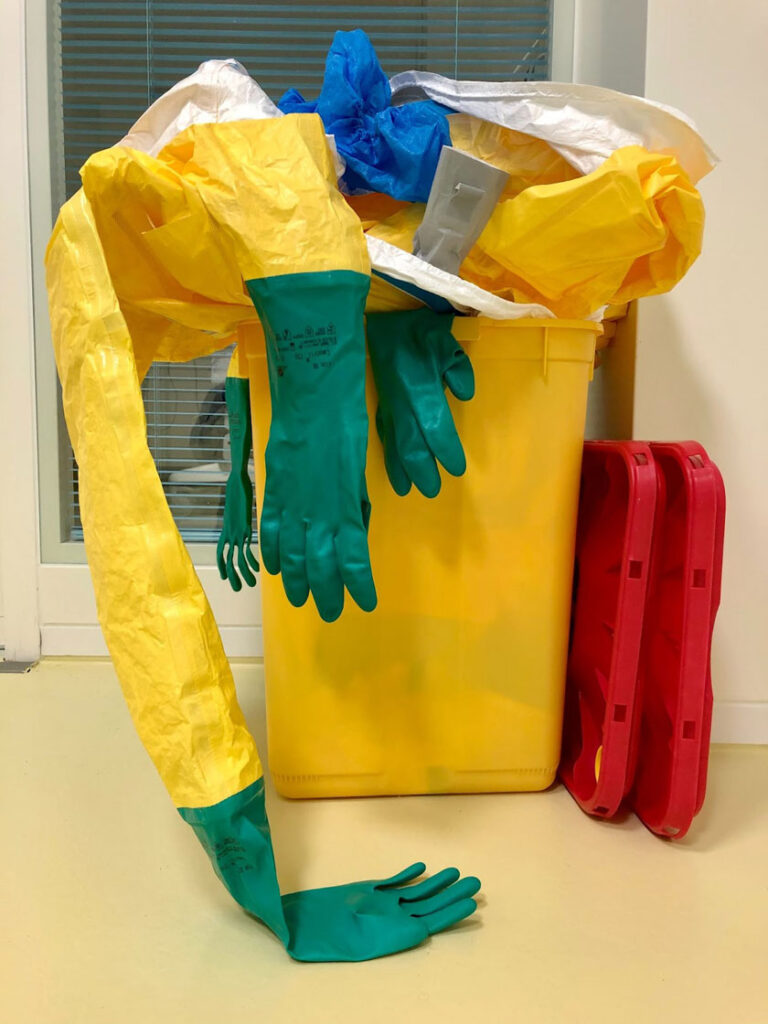
Lastly, here are ten important things to consider before hiring a professional biohazard cleanup team.
- Certification and training: Ensure that the cleanup team is certified and trained in properly handling and disposing of hazardous materials. Ask for proof of their credentials and training.
- Insurance: Verify that the cleanup team is properly insured in case of any accidents or damage to your property during the cleanup process. Ask for proof of insurance.
- Experience: Consider the team’s level of experience in biohazard cleanup. Ask about their work history and how many years they have been in the industry.
- Equipment and tools: Ensure that the cleanup team has the necessary equipment and tools to safely and effectively handle your situation’s specific type of biohazard cleanup.
- Response time: In the event of an emergency, such as a sewage backup or infectious disease outbreak, time is of the essence. Consider the cleanup team’s response time and availability to ensure they can quickly and efficiently handle the situation.
- Communication: Effective communication is crucial when dealing with biohazard cleanup. Choose a cleanup team that communicates clearly and effectively throughout the process, including providing updates on progress and answering any questions you may have.
- Disposal methods: Proper disposal of hazardous materials is critical to ensure the safety of everyone involved. Ensure that the cleanup team follows proper disposal protocols and can provide documentation of the disposal process.
- Availability of references: Consider the availability of references from past clients or organizations that have used the cleanup team’s services. Contact these references to gain insight into the team’s performance and professionalism.
- Cost: Biohazard cleanup can be expensive, so it’s important to consider the cost of the cleanup team’s services. However, don’t make cost the sole determining factor, as choosing a team that is properly certified, trained, and experienced is crucial.
- Reputation: Consider the cleanup team’s reputation in the industry. Research online reviews and check with local organizations, such as the Better Business Bureau, to ensure the team has a good reputation and track record.
By considering these factors, you can make an informed decision when hiring a professional biohazard cleanup team to ensure the safety and proper cleanup of hazardous materials.
Let Utah Disaster Clean Up & Restoration Help
So, if you find yourself in a situation where you need biohazard cleanup services, don’t hesitate to contact Utah Disaster Clean Up & Restoration.
We have the knowledge, experience, and equipment necessary to safely and effectively remove biohazardous materials from your property, restoring it to a safe condition. Call us at (435) 512-1584, and let us rid your property of any potentially harmful biohazards today!
